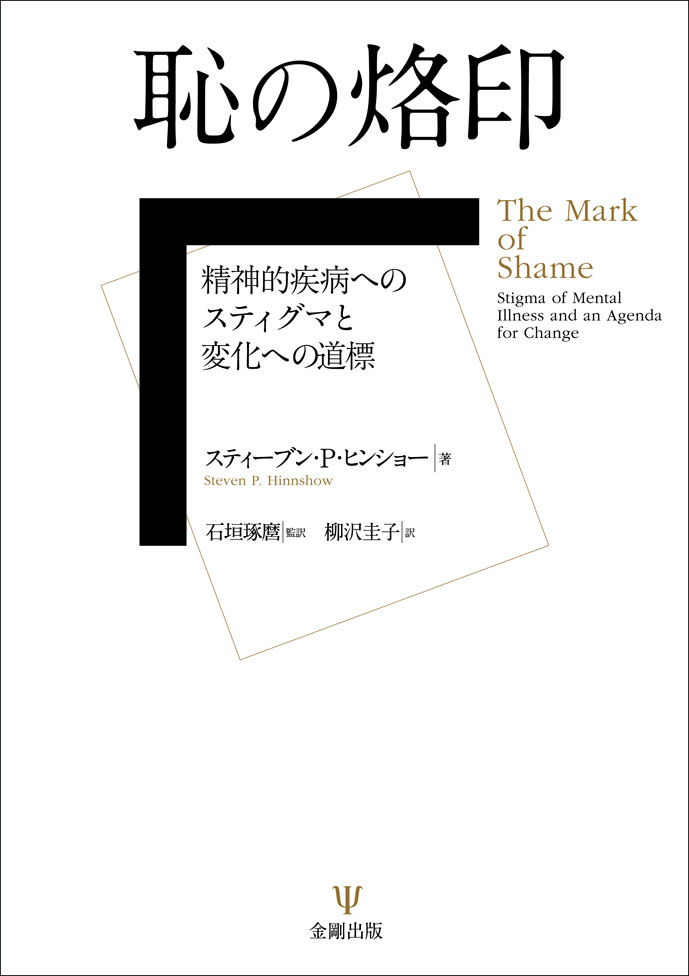
Title
Haji no rakuin (The Mark of Shame - Stigma of Mental Illness and an Agenda for Change)
Size
480 pages, A5 format
Language
Japanese
Released
July 31, 2017
ISBN
9784772415668
Published by
Kongo-Shuppan
Book Info
See Book Availability at Library
Japanese Page
This book is a Japanese translation of Stephen P. Hinshaw’s The Mark of Shame: Stigma of Mental Illness and an Agenda for Change. The author is a professor at the University of California, Berkeley, editor of Psychological Bulletin, and a world-renowned authority on developmental and clinical psychology and ADHD research. He also has direct experience as his father suffered from bipolar disorder.
Do you know the difference between “mental disease” and “mental illness”? This is not a trick question. Behind the two terms are differences pointing to major issues surrounding current psychiatry and psychiatric care and remote causes of stigma. The Japanese translation, a tome of more than 450 page, opens with an analysis of these differences.
Stigma related to mental disorders has a major effect on the person suffering the disorder and on their families, yet there is little research on the subject by Japanese clinical psychologists. This book is a comprehensive work on the stigma of mental disorders written by an American clinical psychologist. It opens with a discussion of mental disorder theory, continues with evolutionary psychology and the theory of stigma, and also discusses from the perspective of developmental psychology the point at which a child starts to stigmatize mental disorder. Perspectives and methodologies are introduced with a depth that can only be achieved by a psychologist. In fact, the book goes on to offer psycho-social methodologies and activities to counter stigma, an area in which research and practice is still in its infancy. These subjects are essential knowledge for the licensed psychologist, a newly established qualification in Japan, whose job includes providing care for those with serious mental disorders.
Persons with mental disorders are stigmatized not only by the general public but by other persons with mental disorders and even medical practitioners. On top of this, there is deep-seated stigma of the whole field of psychiatric medicine within society. For example, in the spring of 2020, a group of psychiatrists in a certain area of Japan were found to be the source of a new coronavirus infection cluster. Doctors specializing in other branches of medicine were quick to post their criticism on social media. “Psychiatrists are a nutty bunch of people. It is just like them to behave dangerously in this situation. They shouldn’t be lumped together with us.” Studies have shown that such prejudice and discrimination against people with mental disorders and the practitioners of psychiatric medicine are quite strong among medical practitioners in many countries. This particular episode highlights how deeply rooted such prejudice is even in 21st-century Japan.
Today, however, persons with mental disorders are speaking directly on television and through social media to disseminate more accurate information on their condition. In 2016, the Act for Eliminating Discrimination against Persons with Disabilities was enacted, and the good news is that some progress is being made in Japan in making the public aware of the stigmas and in implementing anti-stigma laws and regulations. The original English edition of this book was published in 2007, over a dozen years ago, and its contents deal primarily with trends in the latter half of the 20th century. What has changed—or not changed—since the turn of the century regarding the sigma of mental disorders? How is the sigma to be resolved? It is hoped that this translation will provide readers in the 21st century with a guide to how to think and act to eliminate this stigma.
(Written by ISHIGAKI Takuma, Professor, Graduate School of Arts and Sciences / 2020)



 Find a book
Find a book

